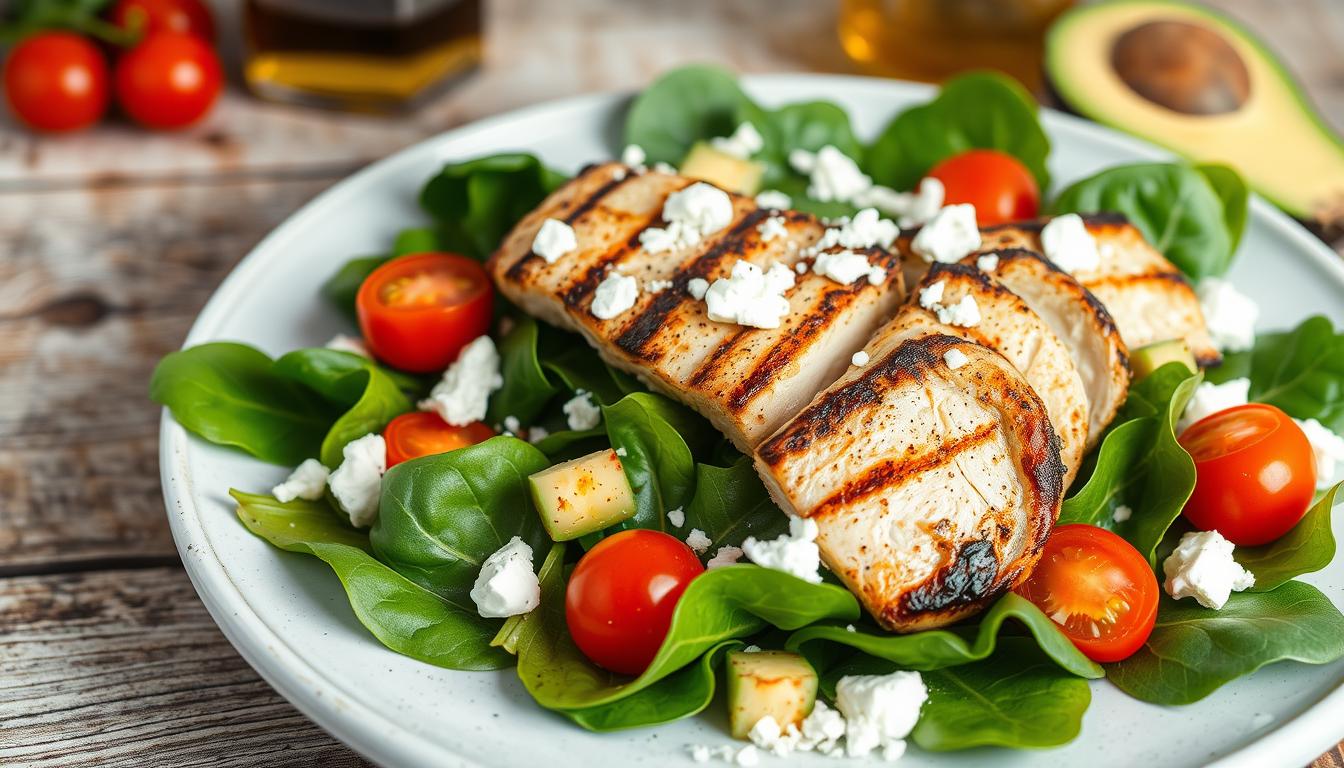Are you dealing with fibromyalgia’s tough symptoms? Did you know 4 million adults in the U.S. live with this chronic condition? Research shows that what we eat might help with fibromyalgia’s muscle pain, fatigue, and sleep issues. Try a tasty spinach salad with grilled chicken for a healthy meal that can ease your symptoms.
Spinach is the main ingredient in this dish, packed with nutrients to fight inflammation. It’s full of Vitamin B, Vitamin E, and omega-3s, all important for managing fibromyalgia. The grilled chicken adds lean protein to keep your body strong and healthy.
What is Fibromyalgia?
Fibromyalgia is a long-term condition that causes widespread muscle pain, fatigue, and sleep issues. It affects about 2-4% of people, mostly women. The exact cause is not known, but it’s thought to involve genetics, brain function, and environmental factors.
Those with fibromyalgia feel pain more easily and may have headaches, stiff joints, and trouble thinking. It makes everyday tasks hard, affecting their quality of life.
Symptoms of Fibromyalgia
- Widespread muscle pain
- Chronic fatigue and lack of energy
- Sleep disturbances and unrefreshing sleep
- Cognitive difficulties, such as memory problems and difficulty concentrating
- Mood disorders, including depression and anxiety
- Headaches and sensitivity to certain foods or environmental stimuli
There’s no cure for fibromyalgia, but dietary changes, medicine, physical therapy, and stress management can help. These steps can improve life for those with this chronic condition.
Dietary Approaches for Managing Fibromyalgia Symptoms
If you have fibromyalgia, what you eat can really help. Some diets may ease the pain, tiredness, and sleep problems you face. This chronic condition affects many people.
Trying a low calorie diet could be a good start. Studies show it can lower inflammation and boost your health. Eating foods that are both nutritious and low in calories helps your body heal.
Also, a vegetarian diet might help. Diets full of fruits, veggies, and whole grains can reduce symptoms. Cutting out foods that cause inflammation can make you feel better.
For some, a low FODMAP diet is beneficial. FODMAPs are carbs that can upset your stomach. Avoiding them might ease bloating, pain, and bowel changes.
Lastly, an anti-inflammatory diet is worth trying. Foods like salmon, berries, and turmeric can fight inflammation. This might help ease your fibromyalgia symptoms.
Finding the right diet for you might take some time. Listen to how your body reacts to different foods. Work with your doctor to find a diet that works best for you.
Anti-Inflammatory Foods to Include
Fibromyalgia is a chronic condition that causes widespread muscle pain, fatigue, and sleep issues. To fight inflammation and manage symptoms, adding anti-inflammatory foods to your diet is key. Some top choices include:
Salmon and Eggs: Protein-Rich Choices
Salmon and eggs are great for protein, helping muscles repair and grow. They also have omega-3 fatty acids, known for their strong anti-inflammatory effects.
Berries and Leafy Greens: Antioxidant-Packed Produce
Berries like blueberries and strawberries are full of antioxidants and anti-inflammatory compounds. Leafy greens, such as spinach and kale, are also packed with vitamins, minerals, and phytochemicals that fight inflammation.
Turmeric: A Potent Anti-Inflammatory Spice
Turmeric, a bright yellow spice, contains curcumin, a compound with strong anti-inflammatory properties. Adding turmeric to your meals can help manage fibromyalgia symptoms.
By choosing these anti-inflammatory foods, you can significantly reduce fibromyalgia’s inflammation and pain. Including them in a balanced diet is a valuable part of managing the condition.

Spinach Salad with Grilled Chicken for Fibromyalgia
If you have fibromyalgia, try the spinach salad with grilled chicken from this article. It’s a great choice to help manage your symptoms. This meal is full of nutrients that fight inflammation and reduce pain and fatigue.
Spinach is loaded with vitamins, minerals, and antioxidants to fight inflammation. Grilled chicken is a lean protein that boosts your health. Together, they make a tasty, healthy dish perfect for your diet.
| Nutrient | Amount |
|---|---|
| Calories | 399.2 |
| Total Fat | 28.8 g |
| Saturated Fat | 3.1 g |
| Polyunsaturated Fat | 11.2 g |
| Monounsaturated Fat | 9.1 g |
| Cholesterol | 0 mg |
| Sodium | 33.1 mg |
| Potassium | 660.7 mg |
| Total Carbohydrate | 36.3 g |
| Dietary Fiber | 10.2 g |
| Natural Sugars | 10.2 g |
| Protein | 12.1 g |
The spinach salad with grilled chicken is also very nutritious. It gives you:
- 187.5% of your daily Vitamin A needs
- 49.6% of your daily Manganese needs
- 45.5% of your daily Folate needs
With only 10 minutes of prep time, this anti-inflammatory meal is easy to make. It’s a great addition to your fibromyalgia management plan.

Benefits of Spinach for Fibromyalgia
If you have fibromyalgia, adding spinach to your meals can make a big difference. It’s full of vitamins, omega-3 fatty acids, and antioxidants. These help lower inflammation and ease fibromyalgia’s tough symptoms.
Vitamins and Minerals
Spinach is loaded with important vitamins and minerals. Here are some:
- Vitamin A, which boosts your immune system and skin health
- Vitamin C, a strong antioxidant that fights inflammation
- Vitamin K, key for blood clotting and bone health
- Folate, vital for making red blood cells and DNA
- Magnesium, which eases muscle pain and fatigue
Omega-3 Fatty Acids
Spinach has omega-3 fatty acids, like ALA. These acids fight inflammation. Eating more spinach can help ease fibromyalgia symptoms.
Antioxidant Power
Spinach is rich in antioxidants like lutein and zeaxanthin. These antioxidants fight off harmful free radicals and reduce oxidative stress. This is great for people with fibromyalgia, as oxidative stress can worsen the condition.

Adding more spinach to your diet can bring many benefits. It can lower inflammation, improve muscle function, and boost your overall health.
Grilled Chicken: A Lean Protein Source
Incorporating lean protein sources like grilled chicken into your diet can change your game. Grilled chicken is tasty and versatile. It also helps with fibromyalgia pain and inflammation.
Lean proteins like grilled chicken are key for an anti-inflammatory diet. They give the body amino acids without too much fat or calories. Adult males need 56 grams of protein daily, while females should aim for 46 grams for health.
Protein is vital for muscle, bone, and skin repair. It also helps make antibodies, enzymes, and hormones. Plus, a high-protein diet can boost metabolism and help with weight management.
| Protein Source | Protein Content (per serving) |
|---|---|
| Grilled Chicken Breast | 27 grams |
| Salmon | 22 grams |
| Lentils | 18 grams |
| Greek Yogurt | 17 grams |
| Eggs | 6 grams |
Adding grilled chicken and other lean protein sources to your diet helps your body fight inflammation. It also supports muscle recovery and overall health. Try different recipes with this nutritious protein to manage fibromyalgia symptoms.

Preparing the Spinach Salad with Grilled Chicken
Are you ready to make a tasty spinach salad with grilled chicken? This dish is great for those with fibromyalgia. It’s full of ingredients that fight inflammation. Follow these steps to make a meal that’s both healthy and delicious.
Marinating and Grilling the Chicken
- In a shallow dish, mix the chicken breasts with your favorite marinade. Choose one that’s anti-inflammatory, like lemon, garlic, and herbs.
- Put the dish in the fridge for at least 30 minutes. Or up to 4 hours to really soak up the flavors.
- Heat your grill to medium-high. Grill the chicken for 5-7 minutes on each side. It should reach 165°F inside.
- Let the chicken rest for 5 minutes after grilling. Then, slice or shred it.
Assembling the Salad
While the chicken cooks, get the salad ready:
- Wash and dry the spinach. Put it in a big bowl.
- Add veggies like cucumbers, tomatoes, or carrots.
- Put the grilled chicken on top. Add avocado, feta, or nuts if you like.
Making the Dressing
Now, make the dressing:
- In a small bowl, mix olive oil, balsamic vinegar, Dijon mustard, salt, and pepper.
- Whisk until it’s smooth and creamy.
- Drizzle the dressing over the salad. Toss to coat everything.
Enjoy your spinach salad with grilled chicken right away. It’s a healthy, anti-inflammatory meal that’s good for fibromyalgia management.
Nutritional Value of the Salad
The spinach salad with grilled chicken is packed with nutrients that can help with fibromyalgia symptoms. It has macronutrients like lean protein, complex carbs, and healthy fats. It also has vitamins and minerals that boost health and well-being.
A single serving of this salad gives you:
- Protein: Grilled chicken breast is a lean protein source, key for muscle repair and maintenance.
- Carbohydrates: The spinach and other greens in the salad offer complex carbs for sustained energy.
- Fiber: The salad is high in fiber, aiding healthy digestion and reducing inflammation.
- Vitamins: Spinach is rich in vitamins A, C, and K, and folate, supporting the immune system and reducing fatigue.
- Minerals: It has essential minerals like magnesium, iron, and calcium, vital for muscle function and bone health.
- Healthy Fats: The olive oil in the dressing provides heart-healthy monounsaturated fats, reducing inflammation.
Adding this spinach salad with grilled chicken to your diet can help manage fibromyalgia symptoms. Learn more about dietary strategies for to improve your health journey.
| Salad Type | Calories per Serving |
|---|---|
| Caesar Salad (without chicken) | 190 calories per cup (100 grams) |
| Pasta Salad (with Italian dressing) | 269 calories per cup (204 grams) |
| Chef Salad (with turkey, ham, and ranch dressing) | 371 calories per serving (249 grams) |
| Greek Salad | 211 calories per serving (319 grams) |
| Cobb Salad | 290 calories per serving (206 grams) |
| Tuna Salad | 466 calories per cup (238 grams) |
| Egg Salad | 571 calories per cup (222 grams) |
| Chicken Salad | 531 calories per cup (226 grams) |
| Macaroni Salad | 451 calories per cup (204 grams) |
| Potato Salad | 462 calories per cup (275 grams) |
Modifying the Recipe for Your Needs
Enjoying the Fibromyalgia-friendly spinach salad with grilled chicken is easy. Customizing the recipe to suit your dietary restrictions and personal preferences is key. Whether you have specific food allergies or just want a flavor twist, this salad can be adapted to meet your needs.
Accommodating Dietary Restrictions
If you have dietary restrictions, like gluten intolerance or nut allergies, you can modify the recipe. Swap the toasted nuts for pumpkin seeds or sunflower seeds for a similar crunch without allergens. Choose a gluten-free salad dressing or make your own homemade version.
Personalized Taste Preferences
This spinach salad is versatile. You can substitute the grilled chicken with sautéed shrimp or baked tofu if you prefer. Try different leafy greens like arugula or kale to find your favorite. Add pomegranate arils or chopped avocado for extra flavor and nutrition.
Remember, the key to a successful customized spinach salad is to listen to your body. Incorporate your dietary restrictions and personal preferences. By making simple adjustments, you can enjoy a delicious and nourishing meal that supports your overall well-being.
| Ingredient | Nutritional Benefits |
|---|---|
| Spinach | Rich in vitamins, omega-3 fatty acids, and antioxidants that can help reduce inflammation. |
| Grilled Chicken | A lean protein source that can help support muscle recovery and overall health. |
| Pumpkin Seeds | Provide 5 grams of protein and close to 20% of the Daily Value (DV) for zinc per 1-ounce serving. |
| Avocado | Rich in healthy fats, vitamins, and minerals, including over 50% of the DV for vitamin K and 41% of the DV for folate. |
| Pomegranate Arils | Contain antioxidant-rich compounds called anthocyanins that can provide additional anti-inflammatory benefits. |
Incorporating the Salad into a Fibromyalgia Diet
Adding the spinach salad with grilled chicken to your diet is easy and beneficial. It helps balance your nutrition and manage symptoms. This recipe includes anti-inflammatory foods that reduce pain and support your health.
To make the salad a part of your meals, try these tips:
- Make the spinach salad a staple in your weekly meal prep, ensuring you have it on hand for quick and easy lunches or dinners.
- Combine the salad with other anti-inflammatory like salmon, berries, and leafy greens to create a balanced, fibromyalgia-friendly diet.
- Use the salad as a base for additional protein, such as grilled tofu or roasted chickpeas, to create a more substantial meal.
- Experiment with different toppings and dressings to keep the salad interesting and appealing, such as adding avocado, nuts, or a homemade balsamic vinaigrette.
A diet rich in whole, nutrient-dense foods is key to managing fibromyalgia. By regularly including the spinach salad, you’re taking a big step towards a healthier lifestyle.
| Ingredient | Nutritional Benefits |
|---|---|
| Spinach | Rich in vitamins, omega-3 fatty acids, and antioxidants that can help reduce inflammation. |
| Grilled Chicken | A lean protein source that can help support muscle health and recovery. |
| Avocado | Provides healthy fats, fiber, and anti-inflammatory properties. |
| Nuts and Seeds | Offer additional anti-inflammatory nutrients, protein, and healthy fats. |
By adding the spinach salad with grilled chicken to your diet, you get a meal full of nutrients. It’s anti-inflammatory and supports your health, helping you manage your condition.
Tips for Managing Fibromyalgia Through Diet
If you have fibromyalgia, managing your symptoms is a big challenge. Your diet can help a lot. Eating anti-inflammatory foods and planning meals wisely can improve your life.
Focus on anti-inflammatory eating to manage fibromyalgia. Foods like salmon, eggs, berries, and leafy greens can help. Adding these to your meals can really help.
Meal planning is key for fibromyalgia patients. Cooking meals ahead of time ensures you eat healthy when you’re tired or in pain. Include more plant-based proteins and whole grains in your diet.
Making lifestyle changes also helps manage fibromyalgia. Regular exercise, stress-reducing activities, and a good sleep schedule are important. They help manage your condition in a holistic way.
Everyone’s fibromyalgia is different, so finding what works for you might take time. Be patient, keep trying, and stay open to new ideas. This will help you manage your symptoms better.
| Anti-Inflammatory Foods | Fibromyalgia-Friendly Meals |
|---|---|
| Salmon, tuna, leafy greens, berries, turmeric, ginger | Greek salad, haddock risotto, tomato and watermelon salad, falafel wraps, eggplant lentil bake |
Additional Fibromyalgia-Friendly Recipes
This section offers more recipes for those with fibromyalgia. You’ll find anti-inflammatory dishes, vegetarian and vegan choices, and low FODMAP meals. These can help manage fibromyalgia symptoms.
It’s important to try different recipes to keep your diet balanced. Anti-inflammatory meals provide essential nutrients to fight inflammation. Vegetarian and vegan options, along with low FODMAP dishes, meet specific dietary needs common in fibromyalgia.
Looking for quick meals or something more complex? This article has a wide range of fibromyalgia-friendly recipes. Each dish is designed to meet the dietary needs of those with fibromyalgia, ensuring tasty and healthy choices.
Source Links
- https://curearthritis.org/recipes/spinach-with-grilled-chicken-wrap/
- https://www.fibrofix.com/pages/21-day-detox
- https://www.healthline.com/nutrition/fibromyalgia-diet-recipes
- https://www.planetayurveda.com/library/diet-chart-for-fibromyalgia/
- https://www.chantalhoeysanders.com/chpt-2-controlling-symptoms-with-fo
- https://fatiguetoflourish.com/whats-the-best-diet-for-chronic-fatigue-syndrome/
- https://wellspring-hc.com/dealing-with-pain-inflammation-your-diet-may-be-to-blame/
- https://www.medicalnewstoday.com/articles/lupus-diet
- https://www.arthritisfoundationasia.com/anti-inflammatory-diet-arthritis.html
- https://revivelifeclinic.com/luscious-locks-salad/
- https://salinecountyne.gov/pdfs/wellness/handouts/2014/2014_04_22_ML_Meal_Plans.pdf
- https://www.verywellhealth.com/leaky-gut-diet-4773680
- https://www.healthline.com/nutrition/mind-diet
- https://www.justdabblingalong.com/heart-healthy-lunch-ideas-everyone/
- https://www.healthline.com/nutrition/high-protein-diet-plan
- https://www.aldridgefamilychiropractic.com/2023/05/22/a-guide-to-foods-with-high-protein-to-help-you-lose-weight/
- https://www.eatingwell.com/30-minute-anti-inflammatory-chicken-dinner-recipes-8606692
- https://elanaspantry.com/dealing-with-chronic-disease/
- https://www.healthline.com/nutrition/salad-calories-how-many
- https://www.medicalnewstoday.com/articles/321683
- https://www.sharecare.com/diet-nutrition/healthy-eating/warm-salad-recipes-under-calories
- https://www.healthline.com/nutrition/healthy-salad-toppings
- https://www.healthline.com/nutrition/paleo-diet-meal-plan-and-menu
- https://www.weightandwellness.com/resources/podcasts/important-minerals-magnesium-zinc-calcium
- https://www.healthline.com/health/gut-health-meals
- https://www.shoestringcottage.com/low-carb-eating-fibromyalgia/
- https://medmunch.com/fibromyalgia-diet-meal-plan-pdf/
- https://casadesante.com/blogs/gut-health/the-benefits-of-a-healthy-diet-for-fibromyalgia-sufferers?srsltid=AfmBOoorD4U36ZAisu6BwCTfuQUo_tLv7FT2XWpaaT8J-38cKCUhpC92
- http://ndl.ethernet.edu.et/bitstream/123456789/36842/1/3125.pdf
